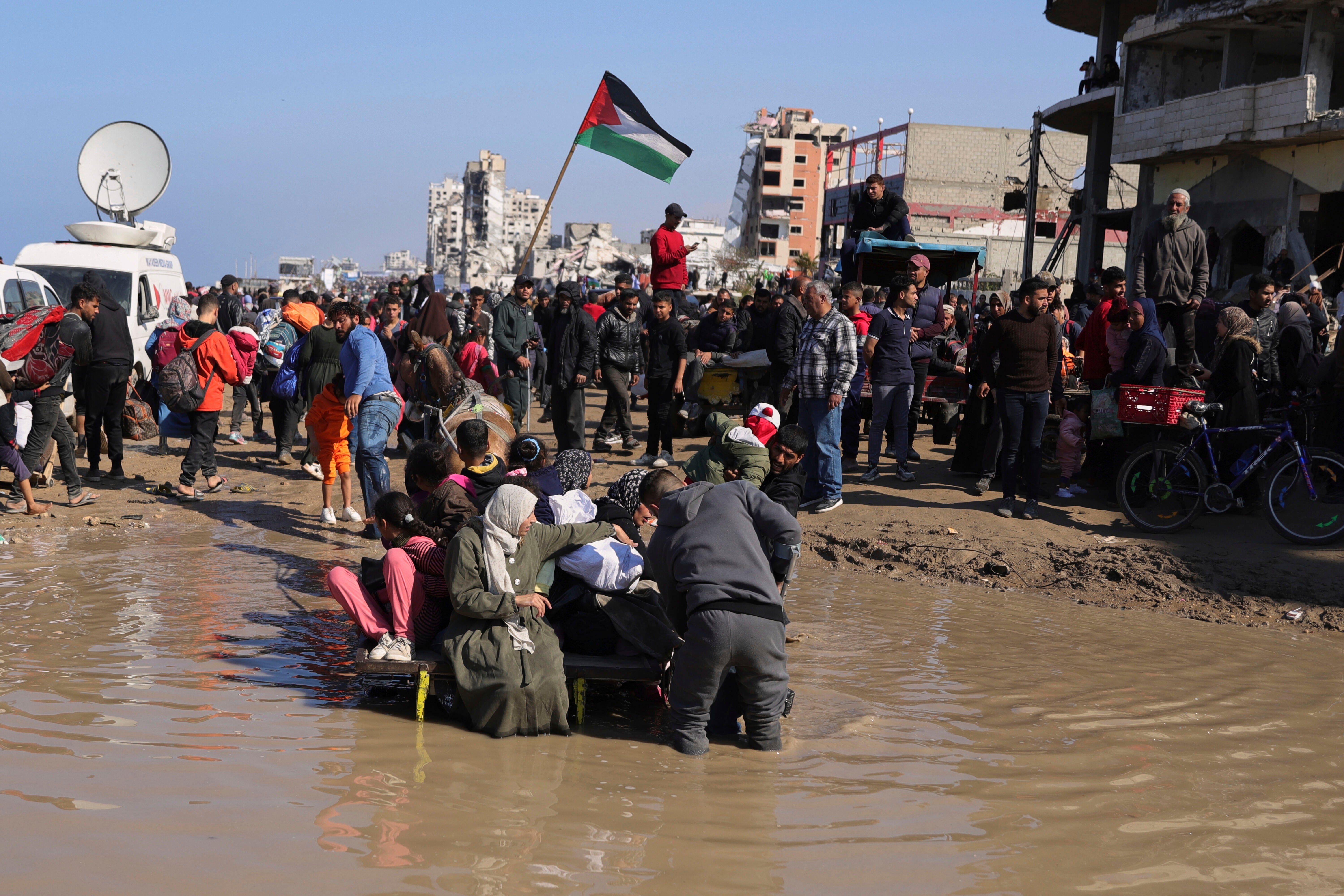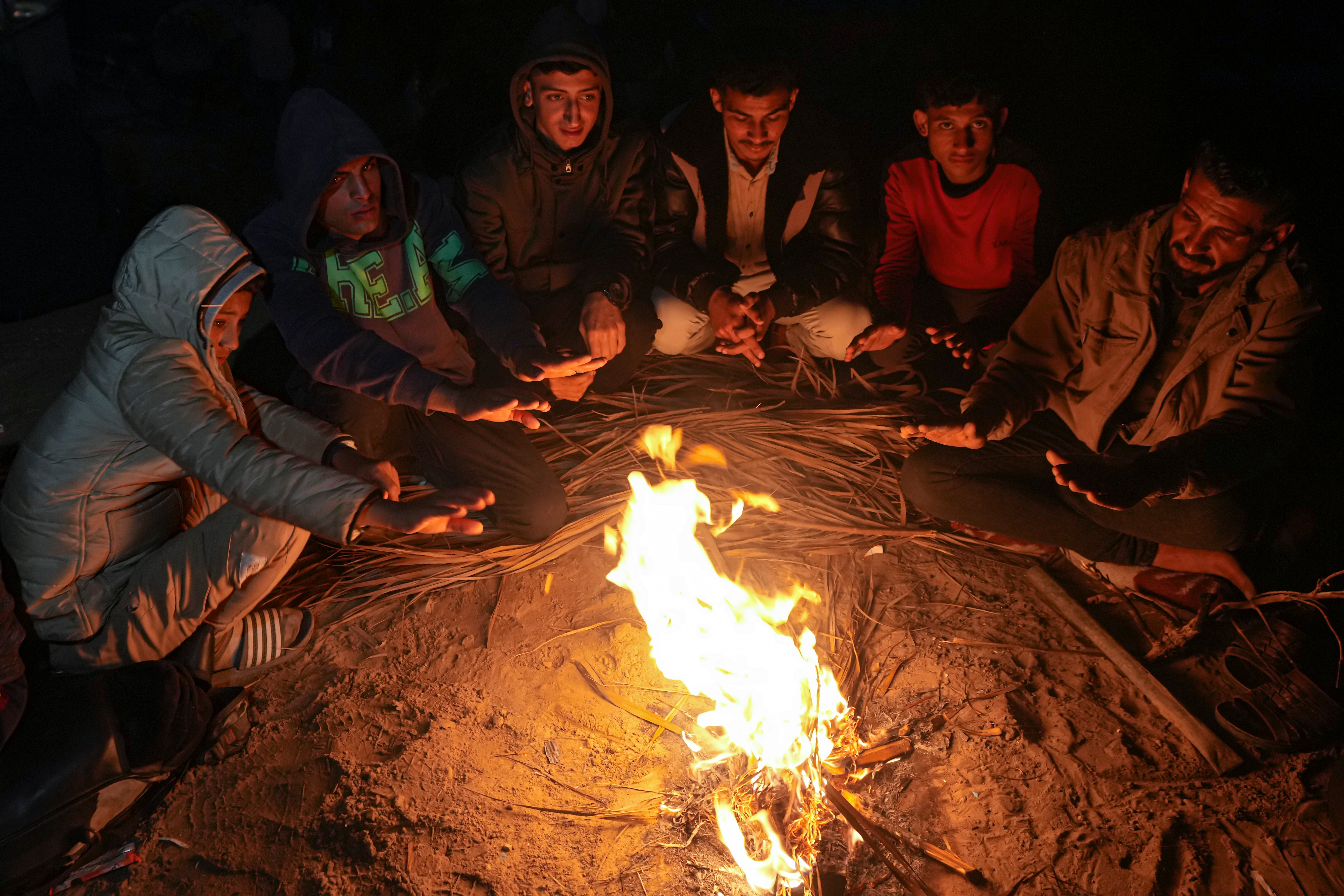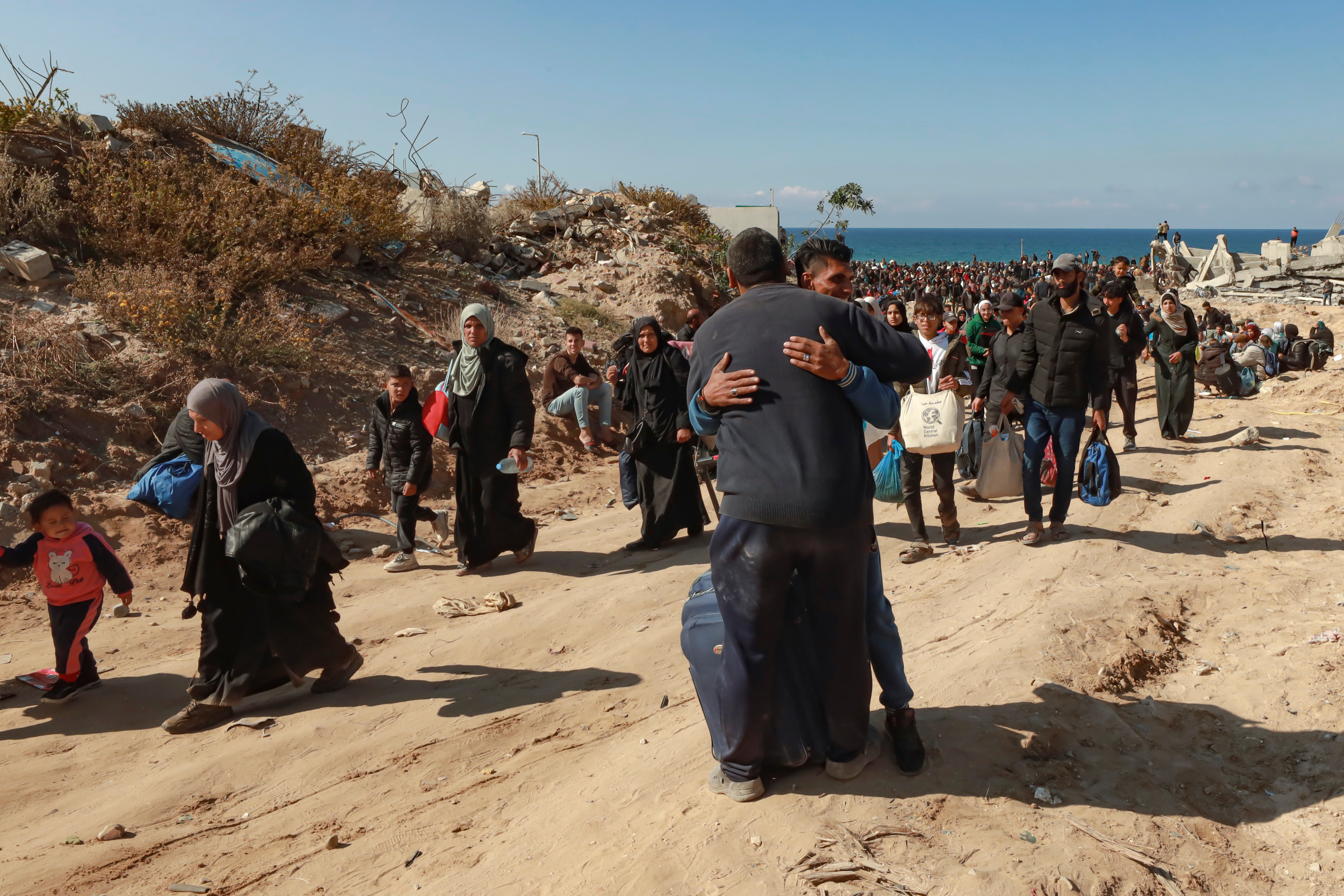Palestinians return to their destroyed homes in north Gaza: ‘The war has taken everything precious to us’
Scrambling over sand banks and craters, hundreds of thousands of Palestinian families describe the long trek back home to Nedal Hamdouna inside Gaza and Bel Trew
Your support helps us to tell the story
From reproductive rights to climate change to Big Tech, The Independent is on the ground when the story is developing. Whether it's investigating the financials of Elon Musk's pro-Trump PAC or producing our latest documentary, 'The A Word', which shines a light on the American women fighting for reproductive rights, we know how important it is to parse out the facts from the messaging.
At such a critical moment in US history, we need reporters on the ground. Your donation allows us to keep sending journalists to speak to both sides of the story.
The Independent is trusted by Americans across the entire political spectrum. And unlike many other quality news outlets, we choose not to lock Americans out of our reporting and analysis with paywalls. We believe quality journalism should be available to everyone, paid for by those who can afford it.
Your support makes all the difference.Clutching plastic bags of clothes, dragging suitcases in wheelbarrows, and holding their children close, Palestinian families in Gaza begin the gruelling march home for the first time since the start of Israel’s ferocious bombardment 15 months ago.
They walked day and night along two roads – one coastal, one central – that connect the north and south of the besieged strip, and which had been severed by Israeli soldiers for more than a year, but opened as part of the Israel-Hamas ceasefire. The roads have been so heavily chewed up by Israeli bulldozers and tanks that, at points, it is an assault course: families have to scramble up towering sandbanks or file along bridges made from rubble over pools and craters.
Among the hundreds of thousands on the 20km trek home is Samira, just 10 years old, who says she has spent the duration of the war in Gaza on the run from bombing, which killed multiple family members. She describes ecstatic reunions as families separated by the fighting were able to see each other for the first time.
“We have been displaced maybe 20 times. I’m so tired of moving, of fleeing. I miss my home, my city, and my friends, and now I’m finally going back to them,” she says, adding that she doesn’t know how to put into words how she feels. “We just left the tent where it was in the south. In the north, our house is still standing, but it’s all burned.”
Mohamed al-Masri, 17, who was displaced from Jabalia refugee camp to Khan Younis in the south, tells The Independent his family was also travelling with no belongings.
“In our excitement to return, we left almost everything behind, even the tent. We only took what we could carry along the way,” he says, torn between feeling “joy and a sense of victory” and deep pain.
“I feel as if my soul has been revived – like we have returned to life again. But it’s a mix of feelings. This war has taken from me the most precious things I had. It took my father, my sister, and many relatives as well. I lost my home.”

In extraordinary scenes, hundreds of thousands of Palestinians streamed into Gaza’s most heavily destroyed area on Monday, after Israel opened the north for the first time since the early weeks of the war with the Hamas militant group.
It was part of the fragile ceasefire agreement that has held for its second week. In the first six weeks of the US, Qatari, and Egyptian-brokered deal, Israeli forces are to withdraw from parts of the strip, while dozens of hostages seized by Hamas on 7 October 2023 – during which they took 250 people hostage and killed around 1,200 more – will be returned home in exchange for hundreds of Palestinians released from Israeli prisons.
Israel launched its heaviest-ever bombardment of Gaza in the wake of the bloody 7 October attack. Since then, Palestinian health officials say Israel’s air and ground offensive has killed more than 47,000, the majority of whom are women and children. It is a death toll and level of destruction so high that rights groups, including Amnesty International and Human Rights Watch, have accused Israel of committing genocide against Palestinians in Gaza, a point Israel vehemently denies.
The United Nations says at least 90 per cent of the 2 million-strong population of Gaza has been displaced. A UN damage assessment released this month showed that it could take 21 years to clear away the more than 50 million tonnes of rubble left in the aftermath of Israel’s bombardment, while costing up to $1.2bn (£965m).

Amid that towering destruction, on Monday joyous crowds of Palestinians walked all day and night, carrying bedrolls, bottles of water, and other basic belongings, as armed and masked Hamas fighters flashed victory signs. The crowd was watched over by Israeli tanks on a nearby hill.
Those who passed through a main checkpoint connecting north and south, once policed by Israeli soldiers, told The Independent that it was now managed by men speaking in Egyptian accents and wearing shirts reading “The Egyptian Qatari Committee”. Videos shared online appeared to back this up.
Overlooking the scene were armed men in tactical gear, whom some families speculated may be US security contractors. The Independent has been sent lucrative job adverts from American contractor companies looking for US special forces veterans, to oversee checkpoints in Gaza as Israeli forces withdrew from certain areas.
“We had to sell our tent to save some money for our journey back,” says 14-year-old Lina al-Mubaid, who was forced to flee her home and then places of shelter 10 times during the war. She narrowly missed being killed when Israeli forces bombed a school where she was sheltering in the centre of the strip.
“We also lost loved ones – my grandfather and many of my cousins. Our home was also destroyed. We’ll live in another tent.

“But I’m so happy that we are returning to our land and home, and that the war is finally over and we’re still alive and safe.”
Rana Youssef, 35, who was forced to flee Gaza City’s al-Shati refugee camp at the start of the bombing, was now returning with her husband and children. The mathematics teacher had set up a tent school for displaced children in the south.
“It was incredible to finally reach my home, reunite with my relatives and loved ones, and shed tears over these bittersweet moments,” she says, adding that she considers herself luckier than most as her house is still standing.
Despite the destruction, she believes Gaza will rise again.
“Our people cannot abandon Gaza. We rebuild, no matter how long it takes.” Ali al-Hayek, 35, a labourer from northern Gaza who was also in the same column of people heading north, agrees.
“Despite all the hardships, we are grateful to be returning,” He tells The Independent with his nine children in tow. “There is nothing like being in your homeland, no matter the challenges. We grew up and lived here. This is where we belong.”

Join our commenting forum
Join thought-provoking conversations, follow other Independent readers and see their replies
Comments